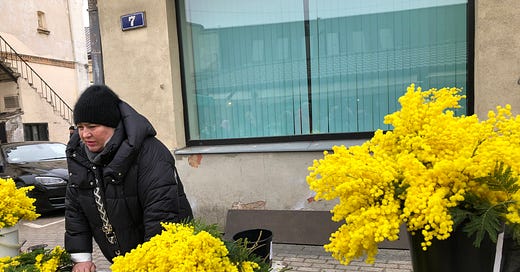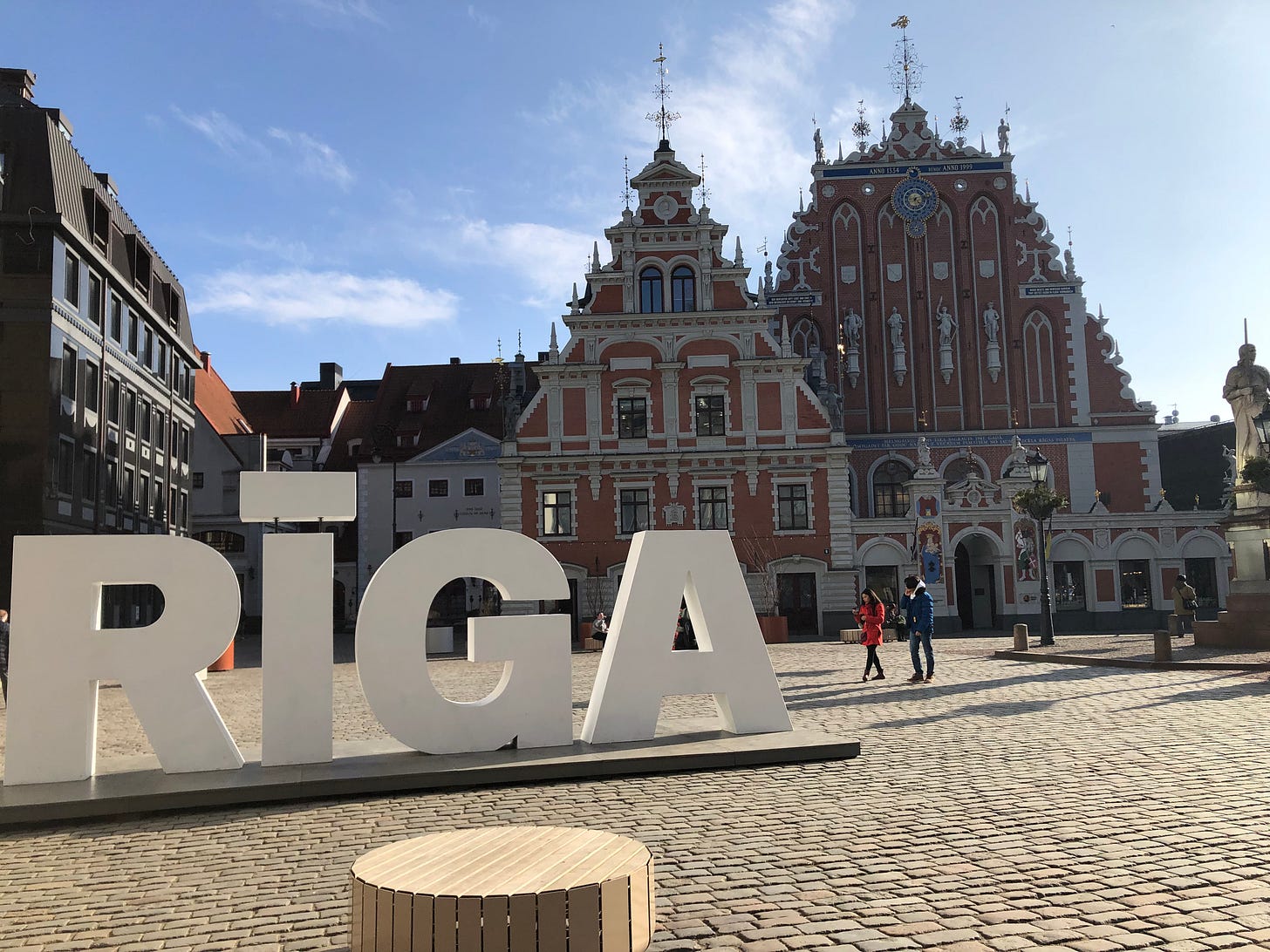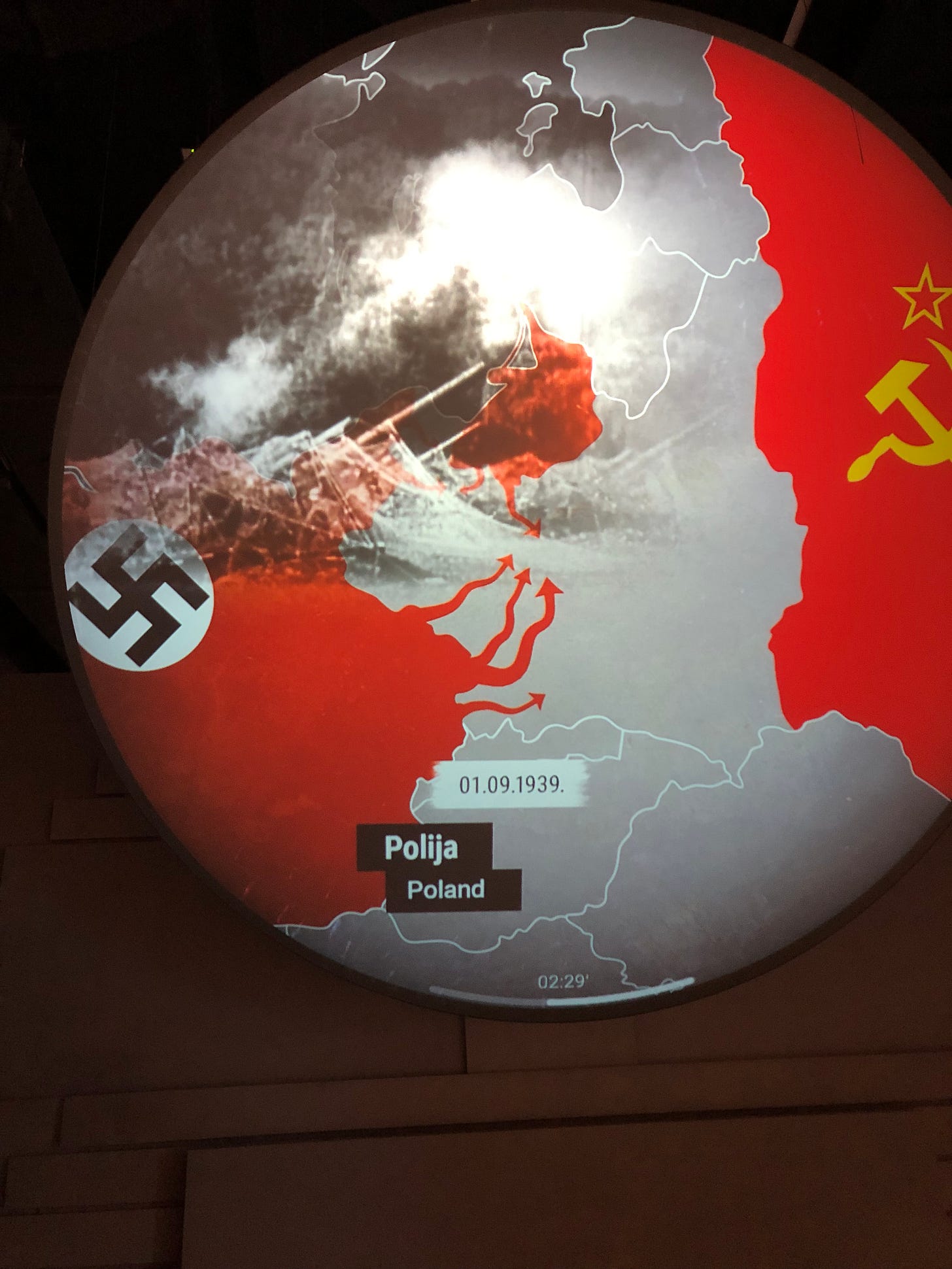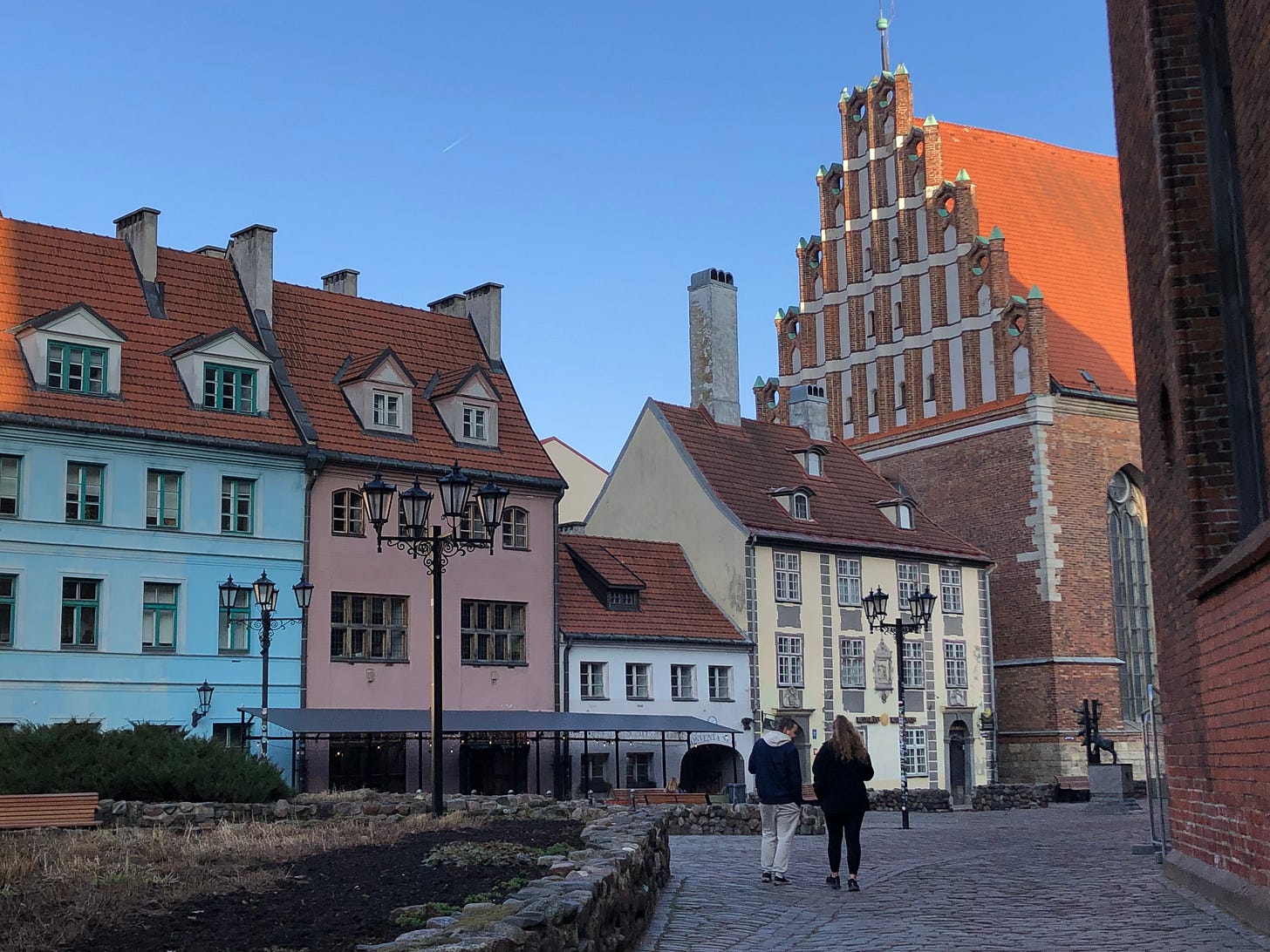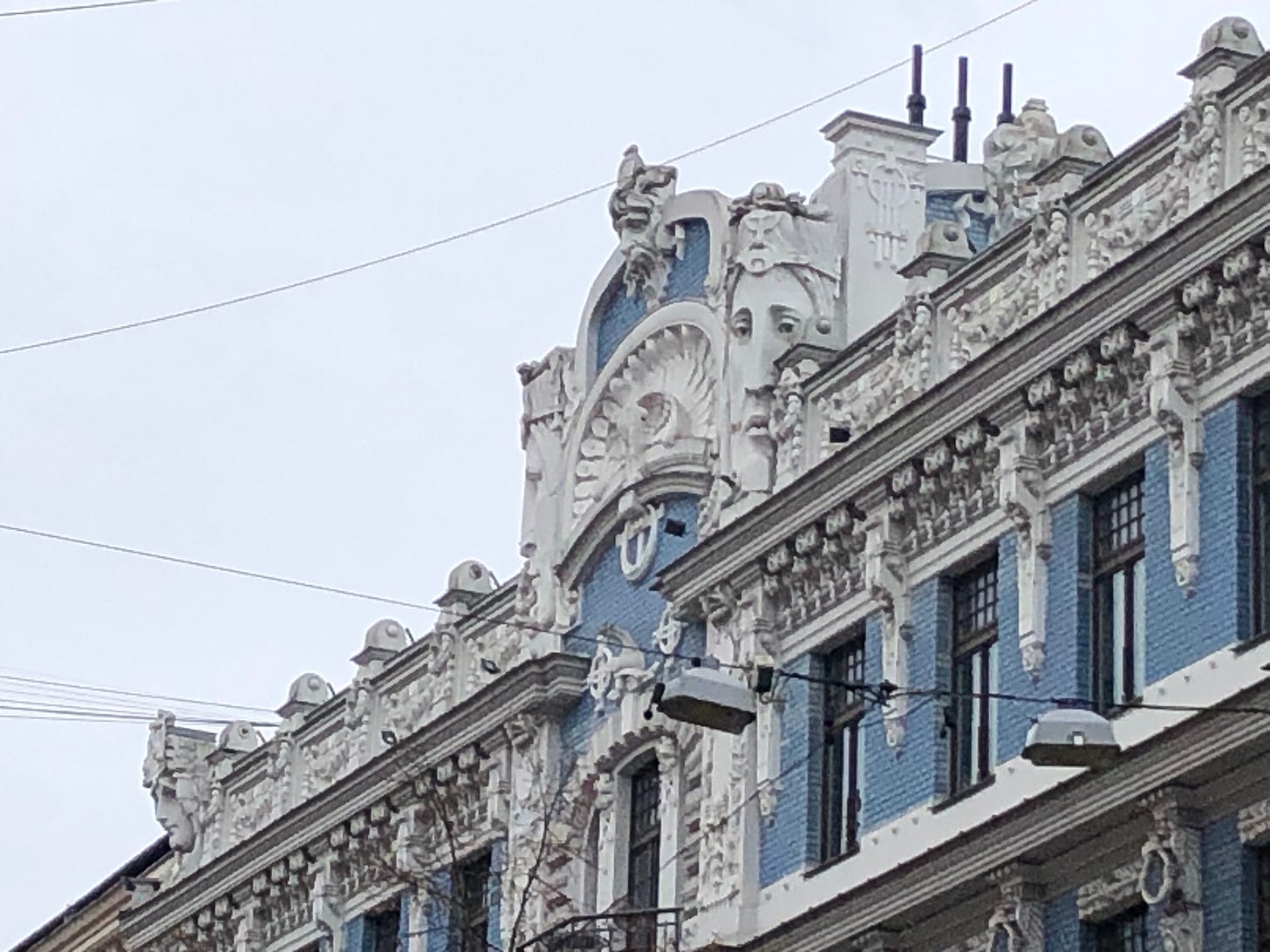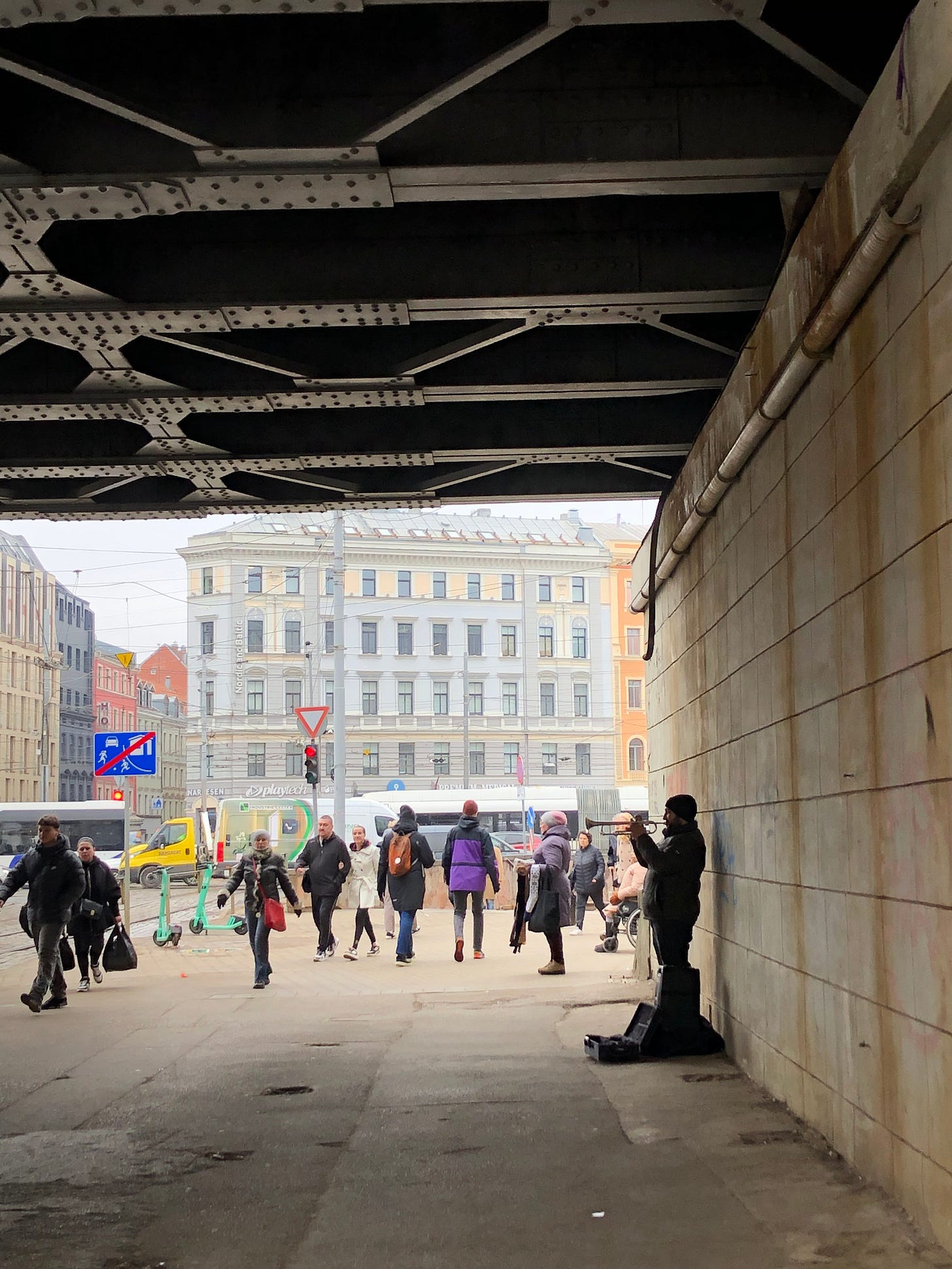First, a personal note: I’m in the middle of helping put on a major gathering here in Copenhagen that takes place at the end of May, which is both why this edition is a little late in getting to you and why it’s frankly anyone’s guess how the rest of the month will go. But by June, I’ll be back on a more regular schedule.
Now, onward to Riga:
After ignoring me for a few moments in favor of her computer screen, the hotel receptionist finally looked up. She wore colorless glasses that seemed like a cry for help. I asked if she had a room, but she was reluctant to consider this possibility.
“You want a room?”
“Yes. This is a hotel, right?”
“Yes,” she sighed, in a tone that suggested I had extracted a difficult truth from the depths of her soul. “Is hotel.”
It took a while longer before she admitted that there was indeed a room available. I knew I was pushing my luck, but I asked to see it. She was a young, fit woman, but she hoisted herself like an arthritic 85-year-old with gout, and led me upstairs. To my surprise, it was charming, with stylish furnishings and a lovely view over the square. “I’ll take it,” I said.
She led me back downstairs. “So you want?” she replied.
I confirmed that I did. She told me it would be 80 euros for the first couple of nights but 90 for the third. I asked why the last night cost more, and she replied that it was Women’s Day. I checked the date in my head. Sure enough, it was coming up on March 8.
“But I’m a woman,” I said. “If it’s International Women’s Day, shouldn’t I actually be charged less?”
This made her laugh, and suddenly, Irina and I were friends. She explained to me that on Women’s Day in Latvia, men give women flowers and other gifts, and take them out for dinner—sort of like Valentine’s Day for the post-Soviet crowd. Irina’s boyfriend was taking her to the countryside for what she called, with unrestrained delight and no hint of menace whatsoever, a meat grill.
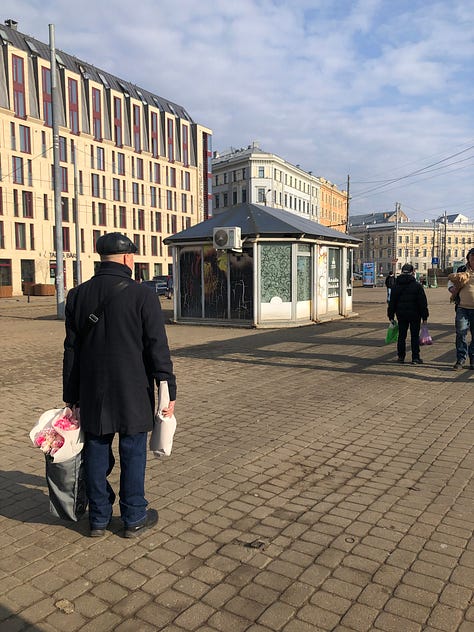
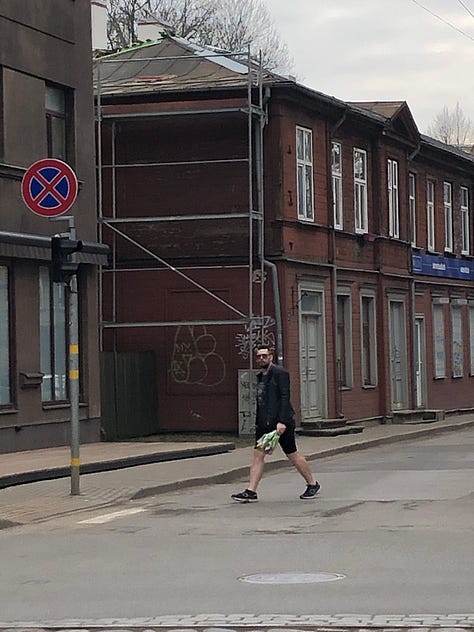
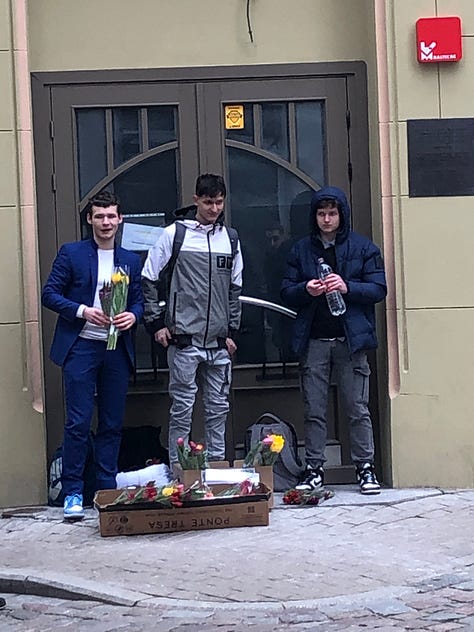
I mean, to each her own. Pondering the vagaries of romance, I dropped my bag and left the hotel to wander through Riga’s Old Town. With its pastel colors and dramatic rooftops, the area was pretty enough, but it also had that banal, hollowed-out feel of so many historic centers in Europe. And parts of it were giving serious Lads-on-a-Stag-Weekend vibes: cronut shops, bars advertising 2-for-1 shots, slightly sticky cobblestones. It was still morning, but it felt like one of those ridiculous beer bikes might turn up at any moment, loaded with guys in cargo shorts pounding pints.1
And then I came upon the Museum of the Latvian Occupation.
If you thought a casual, post-US election jaunt to Gdansk’s World War II museum was high on the Contemporary Resonance Induces Existential Dread scale [CRIED], just try visiting the Museum of the Latvian Occupation a week after a certain mortifying meeting in the White House between Zelensky, Trump, and that yippy attack-Chihuahua known as JD Vance.
The Latvian Occupation museum begins by hitting on some of the same critical points as the Gdansk museum; never would I have expected the words ‘Molotov-Ribbentrop’ to be such a consistent motif in my life at this stage. But Latvia wasn’t just squeezed from both sides during the war, and didn’t just change hands repeatedly between Nazis and Soviets, with each swap generating a fresh wave of mass deportations and deaths. It continued to be squeezed once the war was over, with over 40,000 sent to Siberia in 1949.
It’s a compact museum, which is good, because thirty minutes into it, I definitely needed some air. But as I was walking quickly through the final room, I ran into a tour group of Americans whose local guide was telling them about Latvia joining NATO and the EU. “In my opinion it was the best decision in Latvian history, because if we hadn’t joined, we would be where Ukraine is today,” he said. “Without a doubt, Putin wants to rebuild the USSR.”
One of the tourists, a man in his 40s with a thick neck and a face like a fist, interjected. “Possibly. You don’t know that.”
“Well, I don’t know what’s in Putin’s head,” the guide conceded. “I don’t know what’s in Trump’s head either. I only know history.”
It is fair to say that Latvians are not big fans of Russia, and that the outraged living memory of Russian occupation remains strong. Along with the other Baltic states, the country has been among Ukraine’s strongest supporters, in part because many people there are convinced that should Ukraine fall, Latvia will be next. So arriving there at a time when my government had not only humiliated Ukraine’s heroic leader but had basically opened the door and handed over the keys to the aggressor Putin felt, um, fraught.
There were Ukrainian flags everywhere, and not just the faded ones that look like someone put them out at the start of the war and forgot about them. I saw anti-Putin graffiti scrawled on walls, and an exhibition of frontline photography in one city park. Protest art–including a noose with Putin’s name on it—dotted another. Signs on public transportation reminded Ukrainians that they could travel for free.
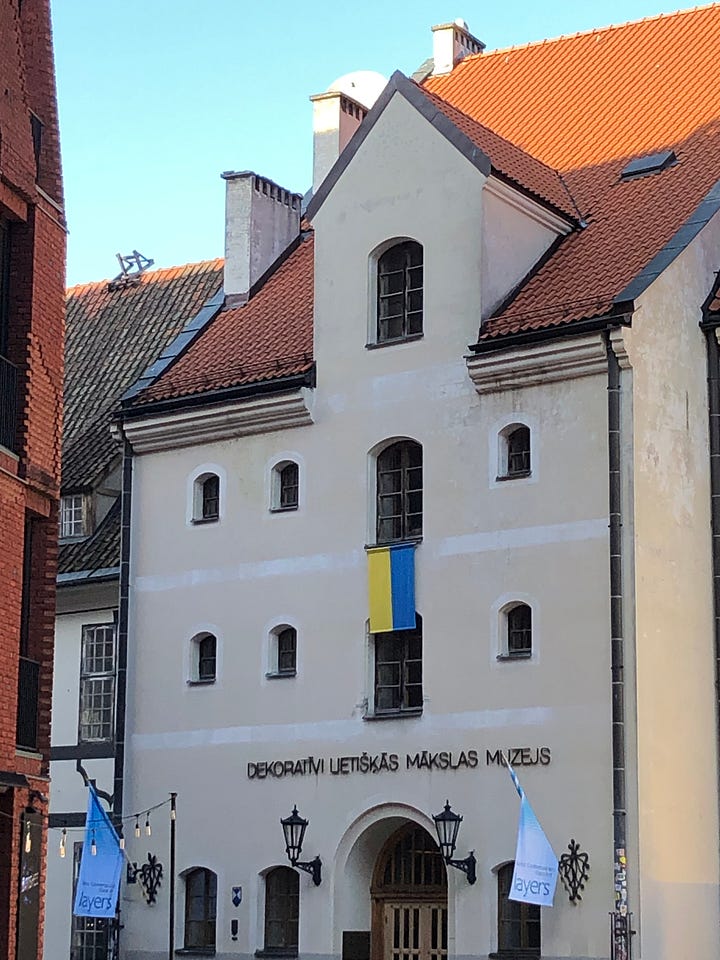
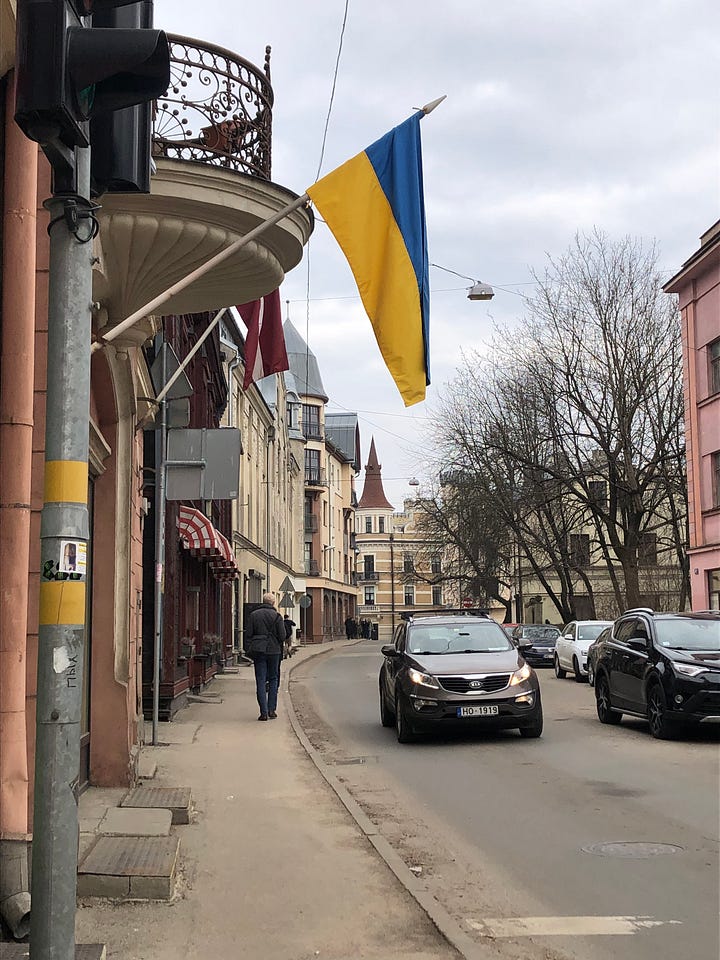
I asked Martha, a salesgirl in a candle shop, how she was feeling about Americans. Her face contracted spontaneously into a grimace before she could stop it, blush, and smoothed it back into a smile. “Sorry,” she said. “It’s not all Americans. Just one.”
I purchased a candle, and Martha threw an extra one in the bag because it was Women’s Day. Then she leaned in to ask the question on everyone’s mind. “How can he say those things to Zelensky?” she asked. “And in front of everyone? Doesn’t he know we see him?”
Not long ago, I was asked to write a piece for the Times on American travelers’ anxieties about how they will be received abroad, given the current political climate. I knew from experience that the premise–will they hate us?--is generally not born out by reality; people around the world know that individuals are not their government. But for the first time in Riga, I found myself wondering the same thing. When I bought a bottle of water from a borshch stall founded by a woman who had fled Kharkiv at the start of the war, I felt compelled to apologize.
I didn’t encounter anything directed at me that would remotely qualify as anti-American sentiment. And I sympathized with Martz, the owner of a wine bar that would easily have passed in Copenhagen (Slogan: Zero Bullshit Wine) had the female guests not been so well-dressed and wrestling with massive Women’s Day bouquets, when he told me he’d rather avoid the subject. “I’d like to think less about the US,” he said. “If you’re an anxious person, it can get to you.”
Still, there was something that was confusing. Because despite the flags, the pro-Ukrainian exhibitions, the support for refugees, to say nothing of the Museum of the Latvian Occupation and well, history itself, I also saw and heard a lot of Russian. (Admittedly, I am not able to distinguish between Russian and Ukrainian, but in several cases, the context—women with Louboutins and hyperbolic lips; a poster for a Chekhov performance—made me pretty certain the language in question was Russian). I decided to take the matter up with my new friend, Irina.
“I’m confused,” I told her when I got back to the hotel. “I keep seeing and hearing Russian, but I thought you Latvians didn’t like Russians very much.”
She sucked in her breath as if I had punched her. “Many people speak Russian,” she said stiffly. “Should we not be allowed to communicate?”
Too late, things I had learned in my reporting four or five years ago came flooding back. All the Baltic states have large Russian minorities, and debate over their integration and loyalties have been divisive since the collapse of the Soviet Union: uneven citizenship accorded ethnic Russians, questions about whether they were spreading pro-Kremlin propaganda, controversies over bilingual education and the tearing down of Soviet-era monuments. But the start of the war war in Ukraine has enflamed passions; in Latvia, a de-Russification campaign has included threats to deport any citizens who do not speak a mandated level of Latvian.
Irina was born in Latvia, and grew up speaking Russian at home. As a result of that ethnicity, she was not automatically granted citizenship, and although her parents could have obtained for her before she turned 14, she said that they weren’t aware of the option. When she tried at age 15 to apply for it herself, she was told it was too late, and that she would have to go through the naturalization process. This outraged her. “You are telling me, who has lived here all my life, who speaks perfect Latvian, who knows the history and the literature, that I have to naturalize?” she exclaimed. “Are you joking?”
On Irina’s passport, it reads ‘Alien.’ She has to apply for a special visa if she wants to travel. And she can’t get a governmentment job. At this, the idea of this, laughs bitterly. “Have you seen my last name? I would never be able to get a job just because of that.”
I was a little worried my new friend and I might not see eye to eye on the war in Ukraine, but before I could ask, her boss loomed into the reception doorway. “We would be happy to arrange a shuttle for you should you want one,” Irina said fluidly, as if we had been talking about airport transportation all along.
My time in Riga wasn’t all geopolitics. The city has some tremendously great markets, including the central one, where vendors sold piles of fat pomegranates and fatter balls of fresh cheese and the flower stalls were piled high with yellow mimosas, just in time for Women’s Day. Something like a third of the architecture in Riga’s center dates to the Art Nouveau period, and the highly ornamented buildings, especially those along Alberta and Elisabeta streets—·which includes the famous long faces adorning one built by filmmaker Sergi Eisenstein’s dad—are captivating. At the other end of the ornamental spectrum, Kalnciem’s Quarter, with its older, simpler wooden houses, makes for a nice stroll. And the bibliophile in me loved the whimsical sculpture of two readers outside a national library that looks like something the Heat Miser would have built.
But politics kept pushing its way in. On my last day in Riga, I stumbled upon the closing ceremony of the Latvian documentary film festival. Films about the war made up the bulk of the works in competition, and one winner looked precisely on the support for Russia that lurked beneath the apparently unified Latvian surface. The main award, however, went to a Ukrainian documentary that focused on a tour guide in Ukraine who, when the war broke out, converted the van she used to tote tourists around into a hearse of sorts, and criss-crossed the country to retrieve to their loved ones the bodies of soldiers who had been killed on the frontlines.
The filmmaker couldn’t leave Ukraine and had to call into the ceremony by video link. But the award itself was received by the Ukrainian ambassador to Latvia, and she made no pretense of papering over the precarious moment in which we all found ourselves. “We are at a very dangerous turning point in the war where black becomes white and white becomes black,” she said. “Documentaries like this help us give reality back to the world.”
Irina wasn’t working when I checked out, so I never got to ask for her perspective on the war or how she felt about Americans. But it was just as well. There is a reality, yet we humans are nearly constitutionally incapable of perceiving it without imposing interpretation, and I suspected that mine and Irina’s differed pretty violently. There is flesh on the fire, but whether we call it a meat grill or a barbecue depends on where we come from.
The Addresses
Below, you’ll find a list of the places where I ate, drank, and stayed in Riga. But, a gentle reminder: wouldn’t it be more fun to find your own?

